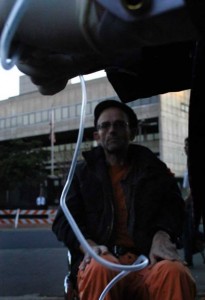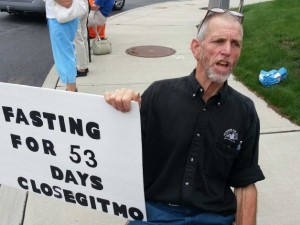In July 2013, Human Rights First released
Guantanamo: A Comprehensive Exit Strategy
http://www.humanrightsfirst.org/uploads/pdfs/close-GTMO-july-2013.pdf
Massimino Congressional Testimony to Detail Roadmap for Closing Guantanamo
Washington, DC – Human Rights First President and CEO Elisa Massimino will testify before Congress today and detail a plan for closing the U.S. detention facility at Guantanamo. Massimino’s testimony before Senate Judiciary Committee Subcommittee on the Constitution, Civil Rights and Human Rights comes two months after President Obama’s National Defense University speech reiterating his commitment to shuttering the facility and as Members of Congress from across the political spectrum recognize the importance of making progress toward that goal.
“Some would have you believe that Guantanamo’s critics are limited to a handful of human rights activists, some foreigners, and the defense lawyers for detainees imprisoned there. But that’s not true. The loudest and most persistent voices urging that the prison be closed come from senior defense, law enforcement, intelligence, and diplomatic officials of our government—people with a 360-view of the costs and benefits of Guantanamo who have concluded that our national security is best served by closing it,” Massimino will testify. “Whatever one thinks about the initial benefits of detaining prisoners at Guantanamo, there is a growing bipartisan consensus that we no longer need it.”
To accompany Massimino’s testimony, Human Rights First is releasing Guantanamo: A Comprehensive Exit Strategy, a white paper that provides a roadmap for closing the facility and gives practical guidance on how to address the challenges of risk management raise by transferring detainees out of Guantanamo. The comprehensive plan Massimino will address includes the following steps:
- The president should designate a senior official in the White House to oversee the interagency operations and congressional relations needed to close Guantanamo. Public reports suggest that the President has placed Lisa Monaco, his senior counterterrorism advisor, in charge of the White House efforts to close Guantanamo. If so, the White House should communicate this to the public and Congress to facilitate transparency and accountability for its efforts to close Guantanamo.
- The president should submit to Congress a comprehensive plan for the intended lawful disposition of each detainee currently held at Guantanamo, building on and updating the 2010 Guantanamo Review Task Force assessment.
- The White House should vigorously and visibly support the Guantanamo-related provisions in the Senate Armed Services Committee’s version of the National Defense Authorization Act for the 2014 Fiscal Year. These provisions would provide greater authority to the executive branch to transfer detainees from Guantanamo to the United States for prosecution, incarceration, or medical treatment, and clearer authority to repatriate or resettle detainees cleared for transfer.
- The president should veto any legislation that restricts his authority to transfer or otherwise effectuate lawful dispositions for detainees held at Guantanamo.
- The president should direct his national security team to publicly defend the transfer of detainees out of Guantanamo as not only consistent with but also necessary to our national security interests, and outline how any risks associated with transfers will be managed.
Massimino’s testimony comes amidst growing bipartisan efforts to find solutions to closing the facility. For example, last month, Senators McCain and Feinstein joined Chief of Staff Denis McDonough at Guantanamo and pledged support for closing the prison. Also in June, the Obama Administration announced the appointment of Clifford Sloan to be Special Envoy for Closing Guantanamo at the State Department. The administration is expected to announce the appointment of his counterpart at the Pentagon soon. Today’s hearing marks the first time since 2009 that Congress has held a hearing on Guantanamo.
Massimino will observe, “Among the many challenges facing our country today, closing Guantanamo is far from the most complex. While it may be politically complicated, technically, as Senator McCain recently said, ‘it’s not rocket science.’ It is a risk management exercise. There are tough questions to resolve, to be sure. But there is a clear and pragmatic way forward. With leadership from the President and Congress, we can get this done. “
Among others testifying today are Brigadier General Stephen N. Xenakis (Ret.) and Major General Paul D. Eaton (Ret.), who are members of a larger nonpartisan group of retired generals and admirals who work with Human Rights First to ensure that U.S. war, counterterrorism, and intelligence-gathering is in line with American values and human rights. In addition, Major General Michael Lehnert (Ret.), the first commander of the U.S. detention facility at Guantanamo, will submit testimony for the record detailing his belief that the facility should be closed.
To speak with Massimino or for more information about today’s hearing or Human Rights First’s paper Guantanamo: A Comprehensive Exit Strategy, please contact Brenda Bowser Soder at [email protected] or 202-370-3323.






